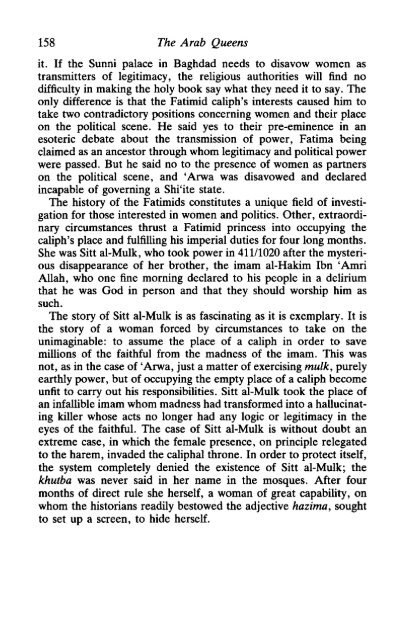Fatima.Mernessi_The-Forgotten-Queens-of-Islam-EN
Fatima.Mernessi_The-Forgotten-Queens-of-Islam-EN
Fatima.Mernessi_The-Forgotten-Queens-of-Islam-EN
You also want an ePaper? Increase the reach of your titles
YUMPU automatically turns print PDFs into web optimized ePapers that Google loves.
158 <strong>The</strong> Arab <strong>Queens</strong><br />
it. If the Sunni palace in Baghdad needs to disavow women as<br />
transmitters <strong>of</strong> legitimacy, the religious authorities will find no<br />
difficulty in making the holy book say what they need it to say. <strong>The</strong><br />
only difference is that the Fatimid caliph's interests caused him to<br />
take two contradictory positions concerning women and their place<br />
on the political scene. He said yes to their pre-eminence in an<br />
esoteric debate about the transmission <strong>of</strong> power, <strong>Fatima</strong> being<br />
claimed as an ancestor through whom legitimacy and political power<br />
were passed. But he said no to the presence <strong>of</strong> women as partners<br />
on the political scene, and 'Arwa was disavowed and declared<br />
incapable <strong>of</strong> governing a Shi'ite state.<br />
<strong>The</strong> history <strong>of</strong> the Fatimids constitutes a unique field <strong>of</strong> investigation<br />
for those interested in women and politics. Other, extraordinary<br />
circumstances thrust a Fatimid princess into occupying the<br />
caliph's place and fulfilling his imperial duties for four long months.<br />
She was Sitt al-Mulk, who took power in 411/1020 after the mysterious<br />
disappearance <strong>of</strong> her brother, the imam al-Hakim Ibn 'Arnri<br />
Allah, who one fine morning declared to his people in a delirium<br />
that he was God in person and that they should worship him as<br />
such.<br />
<strong>The</strong> story <strong>of</strong> Sitt al-Mulk is as fascinating as it is exemplary. It is<br />
the story <strong>of</strong> a woman forced by circumstances to take on the<br />
unimaginable: to assume the place <strong>of</strong> a caliph in order to save<br />
millions <strong>of</strong> the faithful from the madness <strong>of</strong> the imam. This was<br />
not, as in the case <strong>of</strong> 'Arwa, just a matter <strong>of</strong> exercising mulk, purely<br />
earthly power, but <strong>of</strong> occupying the empty place <strong>of</strong> a caliph become<br />
unfit to carry out his responsibilities. Sitt al-Mulk took the place <strong>of</strong><br />
an infallible imam whom madness had transformed into a hallucinating<br />
killer whose acts no longer had any logic or legitimacy in the<br />
eyes <strong>of</strong> the faithful. <strong>The</strong> case <strong>of</strong> Sitt al-Mulk is without doubt an<br />
extreme case, in which the female presence, on principle relegated<br />
to the harem, invaded the caliphal throne. In order to protect itself,<br />
the system completely denied the existence <strong>of</strong> Sitt al-Mulk; the<br />
khutba was never said in her name in the mosques. After four<br />
months <strong>of</strong> direct rule she herself, a woman <strong>of</strong> great capability, on<br />
whom the historians readily bestowed the adjective hazima, sought<br />
to set up a screen, to hide herself.


